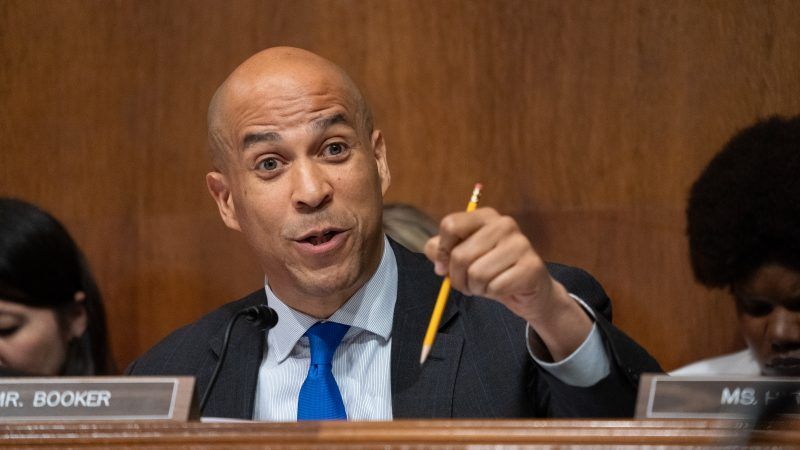Cory Booker's Microstamping Mandate Would Amount to a Ban on New Handgun Models
The Democratic presidential candidate promises to fight for a design requirement that is not currently feasible.

The list of gun control ideas that Cory Booker unveiled yesterday includes that hoary favorite, a ban on "assault weapons," whatever those are. But it also included a less familiar proposal that would amount to a gun ban: "handgun microstamping."
As the New Jersey senator and Democratic presidential contender explains, "Microstamping is technology that allows law enforcement to identify the source of ammunition used in crimes by making a shell casing traceable to the specific gun that fired the round." The problem is that such technology has not been developed yet in any practical and cost-effective form. So when Booker promises he will "fight to require that microstamping technology be incorporated into new models of semi-automatic handguns sold in the United States," he is actually promising a moratorium on new handgun models until that dream becomes a reality.
That is what happened in California, where a law that took effect in 2013 prohibits the sale of new handgun models unless they are "designed and equipped with a microscopic array of characters that identify the make, model, and serial number of the pistol, etched or otherwise imprinted in two or more places on the interior surface or internal working parts of the pistol, and that are transferred by imprinting on each cartridge case when the firearm is fired." As Judge Jay Bybee noted when he dissented from a 2018 decision in which the U.S. Court of Appeals for the 9th Circuit upheld that mandate, complying with it does not seem to be feasible.
"So far as we can tell from the meager record before us, no one—including CDOJ [the California Department of Justice]—has ever tested any weapon against California's protocol to see whether it is technologically feasible," Bybee wrote. "The result of CDOJ's restrictive testing protocol is undisputed: since at least 2013, no new handguns have been sold commercially in California."
In a brief urging the Supreme Court to review the 9th Circuit's ruling, the Independence Institute's David Kopel, the Millennial Policy Institute's Joseph Greenlee, and the Mountain States Legal Foundation's Cody Wisniewski highlight the consequences of that moratorium on innovation and improvement. "No Californian can take advantage of the last six years of advances in ergonomics, safety, accuracy, or durability," they write. Prohibited products include a "safer and more accurate" version of Ruger's Lightweight Compact Pistol introduced in 2016, a 2014 version of the Sig Sauer P320 equipped with grips of different sizes to better fit women's hands, and new pistols from Smith & Wesson and Walther Arms that reduce the amount of force required to rack the slide, compensating for the limitations of relatively weak, frail, or physically impaired shooters. Because of the microstamping mandate, Kopel et al. note, "Californians are not allowed to purchase these new and safer guns."
The brief argues that California's de facto ban on new handgun models is inconsistent with what the Supreme Court has said about the weapons covered by the Second Amendment. In the landmark 2008 Second Amendment case District of Columbia v. Heller, the Court unambiguously rejected "the argument, bordering on the frivolous, that only those arms in existence in the 18th century are protected by the Second Amendment," saying, "We do not interpret constitutional rights that way. Just as the First Amendment protects modern forms of communications…and the Fourth Amendment applies to modern forms of search,…the Second Amendment extends, prima facie, to all instruments that constitute bearable arms, even those that were not in existence at the time of the founding." The Court reiterated that point in Caetano v. Massachusetts, a 2016 case involving a state ban on stun guns.
The implication, Kopel et al. argue, is that the Second Amendment does not allow California to arbitrarily freeze handgun technology as it existed in 2013. "The Second Amendment applies just the same to arms from 2008 as to arms from 1791," they write. "Thus, the Amendment also applies equally to firearms from 2014 as from 2012."
If the Supreme Court agrees to take up the case, we may have a definitive ruling on the constitutionality of impossible handgun design mandates that will save Cory Booker the effort of fighting to impose one.


Show Comments (50)